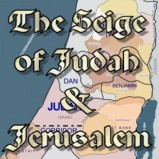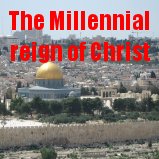| Uzziah - Strengthened by the Lord |  |  |  |
| Thoughts |
| Written by Chris Perver |
| Monday, 10 February 2014 22:36 |
|
A few years ago I wrote an article about the significance of the names of the people and places in the life of Elijah. I was feeling a little depressed at the time, and so was drawn to read of Elijah's own wilderness experience. I received comfort through reading about someone who had experienced similar emotions to those I was feeling at the time. I thought that if I could somehow understand more about this great Bible character and what he had been through, that somehow it might be a help to me in my own life experience. The Lord's graciousness in dealing with Elijah's depression, difficulties and disappointments did indeed prove to be a great help to me. And as I also discovered, the names of the places he visited during his trials would hold a special significance in his life, and even his own name would give expression to the work that the Lord had called him to do. Uzziah is another great Bible character that intrigues me. I like reading about Uzziah because of the help that he received from the Lord. I like reading about him because I know that I need help too, and if the Lord was able to help him, then He could also help me. If I could understand more about Uzziah and how he received this help, perhaps I would be able to receive more help in my own life. Like Elijah, Uzziah's name is extremely significant. Elijah's name in Hebrew is Eliyahu and means 'My God is the Lord'. The nation of Israel, under the leadership of wicked king Ahab and queen Jezebel, was in a state of apostasy. Elijah's primary role was to be a witness to the nation that Lord was the true God. Uzziah, Uzziyahu in Hebrew, means 'Strength of the Lord' or 'The Lord is my strength'. And throughout the record of his reign in 2nd Chronicles 26, you can read about how he received strength from the Lord. The names of the people in Uzziah's life are also extremely significant, and reveal more about the source of Uzziah's strength. Reading the English translation of the Bible we might easily miss their significance, and think that their mention is merely incidental. But in the Hebrew text we can see that there is a purpose to each one, and that they add weight to the specific role that God had given Uzziah to perform. First of all, Uzziah's mother, Jecoliah, is mentioned in verse three. This is unusual. When genealogies are recorded in the Scriptures, usually only the father is mentioned. In the case of king David and the Lord Jesus Christ some women are mentioned, and for specific reasons. Rahab and Ruth were both Gentiles who ended up being in the lineage of the Messiah by virtue of their faith in the God of Israel. But we know very little about Jecoliah. In fact this is the only time she is mentioned in the whole Bible. But when we look at the meaning of her name, we understand a little more as to why she is mentioned here. Jecoliah, or Yecolyahu in Hebrew, means 'The Lord will enable'. Her name is a testimony to the fact that it would be the Lord Himself who would 'enable' Uzziah to reign and to prosper. It is the same for us today. The Lord Jesus Christ said in John 15;5, “Without Me ye can do nothing”. And again in Psalm 127:1, “Except the LORD build the house, they labour in vain that build it”. Compare that with the words of king Nebuchadnezzar in Daniel 4:30, “Is not this great Babylon, that I have built for the house of the kingdom by the might of my power, and for the honour of my majesty?”. King Nebuchadnezzar did not acknowledge that it was the Lord who had enabled him to be king over Babylon. As a result of his pride God removed him from the throne, and it would be seven years before he would recognize the Most High rules in the kingdom of men. When we acknowledge the Lord as the source of our strength, as the one who enables us to do what He has called us to do, He receives the glory and we will be blessed as a result. Uzziah's father's name is mentioned in verse four. Amaziah, or Amatzyahu in Hebrew, it has a similar meaning to Uzziah. Amaziah also means the 'Strength of the Lord', although there is a slight difference. Amaziah comes from the Hebrew root 'amatz' meaning to 'confirm' or 'establish', whereas Uzziah's name comes from the word 'uz' meaning 'power' or 'force'. Just as the Lord will be the one to 'enable' Uzziah to reign and prosper, so He will be the one to 'confirm' and 'establish' him. What are you depending on in this life? Are you being enabled and strengthened by the Lord? Or are you relying on your own strength to try and get you through? Isaiah 26:4 says “Trust ye in the LORD for ever: for in the LORD JEHOVAH is everlasting strength”. A third name is mentioned in this first set of three. We read in verse five that Uzziah sought God in the days of Zechariah, a man who had understanding in the visions of God. Zechariah, or Zecharyahu in Hebrew, means 'The Lord has remembered'. It's good to be enabled and be established by God. But it is also good to be remembered. That does not mean the Lord has forgotten us. But what it does mean is that the Lord has not let our state go unnoticed. Has has seen our sorrows, our heartaches, our disappointments. And He will bring them to an end, and bring the blessing into our lives that He has promised. In Genesis 8:1 we read that the Lord 'remembered' Noah and his family when they were in the ark. We also read in Exodus 2:24 that the Lord 'remembered' His covenant with Abraham, Isaac and Jacob when the Israelites were in bondage in Egypt. That is, the Lord had seen their plight, and would now fulfil His promise to them by sending deliverance. Verse five also says that Zechariah had understanding in the visions of God. This is the first mention of a man who has been given a specific ability by God for the purpose of helping the king. His vision, his steadfast focus on the things of God, is what enabled Uzziah to 'seek the Lord'. Are we like Zechariah? Are we looking to the Lord for our help? Are our eyes focused on spiritual things? Or has God given us a specific gift or ability to use for the benefit of others? Are we an encouragement to other people to live for God? |
|
|
|
|
|
|



